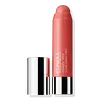What's inside
What's inside
 Key Ingredients
Key Ingredients

 Benefits
Benefits

 Concerns
Concerns

 Ingredients Side-by-side
Ingredients Side-by-side

Isodecyl Isononanoate
EmollientPolyethylene
AbrasivePropylene Glycol Dicaprylate/Dicaprate
EmollientHdi/Trimethylol Hexyllactone Crosspolymer
Euphorbia Cerifera Wax
Bis-Diglyceryl Polyacyladipate-2
EmollientDiisopropyl Dimer Dilinoleate
EmollientOzokerite
Emulsion StabilisingSqualane
EmollientCeresin
Emulsion StabilisingHydrogenated Polyisobutene
EmollientSilica
AbrasiveOctyldodecanol
EmollientPhytosteryl Isostearate
Skin ConditioningOryzanol
Skin ConditioningTocopheryl Acetate
AntioxidantLauroyl Lysine
Skin ConditioningLecithin
EmollientSynthetic Beeswax
Emulsion StabilisingLauryl PCA
HumectantCaprylyl Glycol
EmollientEthylene/Propylene/Styrene Copolymer
Propylene Carbonate
SolventDisteardimonium Hectorite
StabilisingTin Oxide
AbrasiveButylene/Ethylene/Styrene Copolymer
Alumina
AbrasiveSynthetic Fluorphlogopite
Mica
Cosmetic ColorantCI 77891
Cosmetic ColorantCI 77491
Cosmetic ColorantCI 77492
Cosmetic ColorantCI 77499
Cosmetic ColorantCI 15850
Cosmetic ColorantCI 19140
Cosmetic ColorantCI 42090
Cosmetic ColorantCI 75470
Cosmetic ColorantCI 77742
Cosmetic ColorantCI 77510
Cosmetic ColorantCI 45380
Cosmetic ColorantCI 73360
Cosmetic ColorantCI 77288
Cosmetic ColorantCI 77289
Cosmetic ColorantCI 77163
Cosmetic ColorantCI 77007
Cosmetic ColorantCI 17200
Cosmetic ColorantCI 45410
Cosmetic ColorantCI 15985
Cosmetic ColorantIsodecyl Isononanoate, Polyethylene, Propylene Glycol Dicaprylate/Dicaprate, Hdi/Trimethylol Hexyllactone Crosspolymer, Euphorbia Cerifera Wax, Bis-Diglyceryl Polyacyladipate-2, Diisopropyl Dimer Dilinoleate, Ozokerite, Squalane, Ceresin, Hydrogenated Polyisobutene, Silica, Octyldodecanol, Phytosteryl Isostearate, Oryzanol, Tocopheryl Acetate, Lauroyl Lysine, Lecithin, Synthetic Beeswax, Lauryl PCA, Caprylyl Glycol, Ethylene/Propylene/Styrene Copolymer, Propylene Carbonate, Disteardimonium Hectorite, Tin Oxide, Butylene/Ethylene/Styrene Copolymer, Alumina, Synthetic Fluorphlogopite, Mica, CI 77891, CI 77491, CI 77492, CI 77499, CI 15850, CI 19140, CI 42090, CI 75470, CI 77742, CI 77510, CI 45380, CI 73360, CI 77288, CI 77289, CI 77163, CI 77007, CI 17200, CI 45410, CI 15985
Ingredients Explained
These ingredients are found in both products.
Ingredients higher up in an ingredient list are typically present in a larger amount.
Ci 77491 is also hydrated iron III oxide. It's sole purpose is to give a red/pink hue to products.
Iron III oxides are classified as inorganic chemicals for coloring.
Synthetically created Ci 77491 is considered safer than those naturally found. This is because the synthetically created version may contain less impurities. Iron oxides are generally non-toxic and non-allergenic.
Learn more about CI 77491Ci 77492 is also hydrated iron III oxide. It's sole purpose is to give a yellow hue to products.
Iron III oxides are classified as inorganic chemicals for coloring.
Synthetically created Ci 77492 is considered safer than those naturally found. This is because the synthetically created version may contain less impurities. Iron oxides are generally non-toxic and non-allergenic.
Learn more about CI 77492Ci 77499 is also hydrated iron III oxide. It is created from mixing red and black iron oxides. This helps give shades of darkness to a product.
Iron III oxides are classified as inorganic chemicals for coloring.
Ci 77891 is a white pigment from Titanium dioxide. It is naturally found in minerals such as rutile and ilmenite.
It's main function is to add a white color to cosmetics. It can also be mixed with other colors to create different shades.
Ci 77891 is commonly found in sunscreens due to its ability to block UV rays.
Learn more about CI 77891Mica is a naturally occurring mineral used to add shimmer and color in cosmetics. It can also help improve the texture of a product or give it an opaque, white/silver color.
Serecite is the name for very fine but ragged grains of mica.
This ingredient is often coated with metal oxides like titanium dioxide. Trace amounts of heavy metals may be found in mica, but these metals are not harmful in our personal products.
Mica has been used since prehistoric times throughout the world. Ancient Egyptian, Indian, Greek, Roman, Aztec, and Chinese civilizations have used mica.
Learn more about MicaTocopheryl Acetate is AKA Vitamin E. It is an antioxidant and protects your skin from free radicals. Free radicals damage the skin by breaking down collagen.
One study found using Tocopheryl Acetate with Vitamin C decreased the number of sunburned cells.
Tocopheryl Acetate is commonly found in both skincare and dietary supplements.
Learn more about Tocopheryl AcetateEuphorbia Cerifera wax comes from a shrub in Northern Mexico. It is used to stabilize formulations and has emollient properties.
Emollients form a thin layer on top of skin to prevent water from evaporating, keeping skin and lips hydrated.
According to a manufacturer, this wax can range from a yellow/brown color to translucent.
Learn more about Euphorbia Cerifera Wax